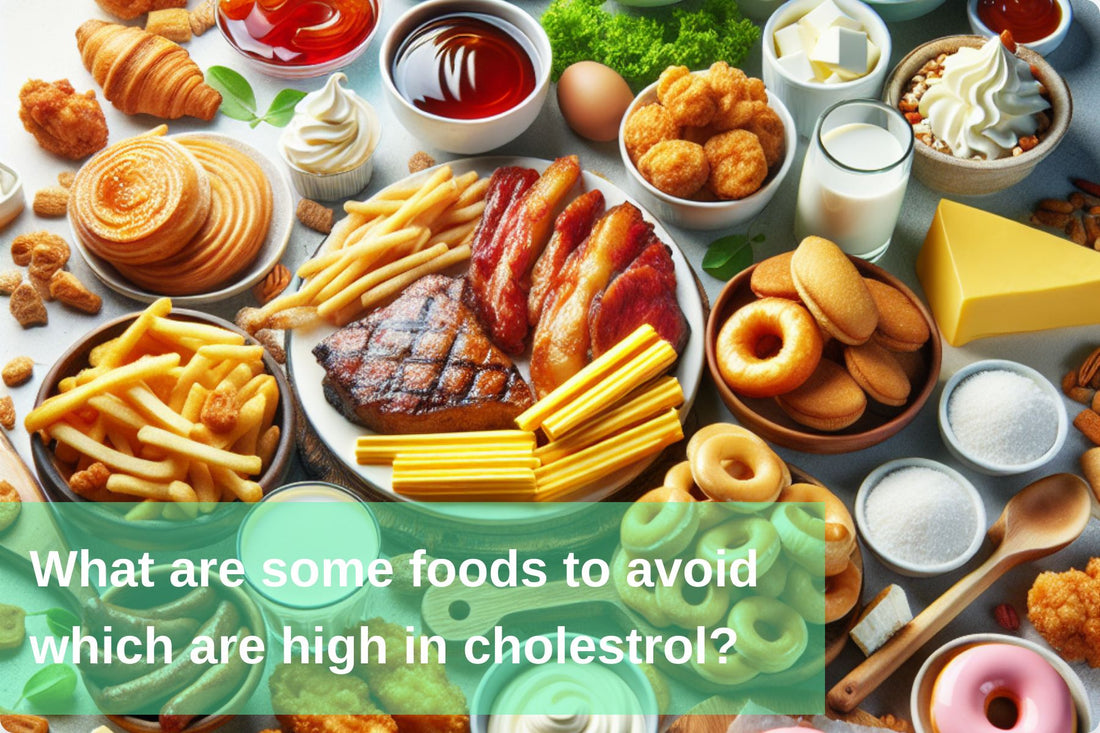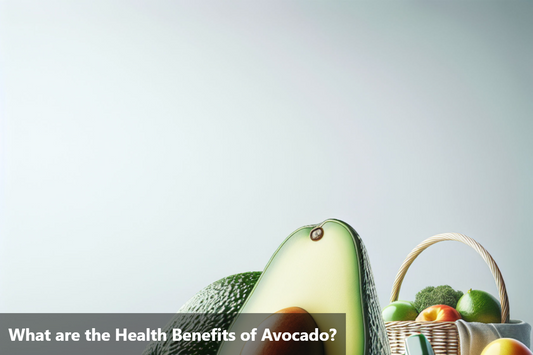In this speedy moving world, many wish to live healthily. Amongst the important aspects is to be remaining conscious in consuming healthy foods to maintain cholesterol in balance. Cholesterol is essentially required by our body but excess amounts lead to serious health problems. High cholesterol, especially an absurd amount of LDL (low-density lipoprotein), may cause an increasing risk of heart disease and stroke.
What we eat is associated with our cholesterol level so it's important to be cautious in food. This blog is here to talk about how our diet can affect cholesterol and why it's important to choose our food wisely. By the end of this read, you'll know just how simple changes into what you eat can help manage your cholesterol levels hence managing your overall health. Let's get started on this journey of a better lifestyle.
Understanding Cholesterol
Cholesterol is a substance in our body that's important for normal functioning. There are two main types: LDL (low-density lipoprotein) and HDL (high-density lipoprotein).
LDL, often called "bad" cholesterol, carries cholesterol to cells. Too much LDL can lead to plaque buildup in arteries, increasing the risk of heart problems. On the other hand, HDL, known as "good" cholesterol, helps remove LDL from the bloodstream, lowering the risk of heart issues.
High cholesterol levels can vary, but generally, total cholesterol above 200 mg/dL is considered high. LDL levels over 100 mg/dL are concerning, and HDL levels below 40 mg/dL may pose risks.
Understanding these cholesterol details is important for managing it well. It's not just about the numbers; it's about finding a balance for a healthy heart. In the next sections, we'll talk about specific foods that can affect cholesterol levels, giving you practical tips for making healthier choices.
Foods Contributing to High Cholesterol
When it comes to keeping your cholesterol in check, what you eat matters a lot. Some foods can make your cholesterol go up, and those are the ones we need to be careful about. These include foods high in cholesterol and saturated fats, which can increase the LDL (low-density lipoprotein) cholesterol in your body and might raise the chance of having heart problems.
Foods with lots of cholesterol are things like liver, egg yolks, and certain shellfish. Even though these foods are good for you in moderation, having too much can make your cholesterol levels go up. Saturated fats are in processed meats, fatty meats, full-fat dairy products, and oils like coconut and palm oil. These fats can also make your LDL cholesterol go higher.
When LDL cholesterol builds up on the walls of your arteries, it can create plaques that block blood flow, making it harder for your heart to work properly. To take care of your heart, it's important to be mindful of what you eat. Choosing lean proteins, adding more fruits and vegetables to your meals, and using healthier cooking oils are simple but effective ways to keep your cholesterol levels in balance. In the next parts, we'll talk more about different kinds of foods and share practical tips for a diet that's good for your cholesterol.
Processed and Fried Foods
Foods that are processed and fried, commonly found in fast-food today, can harm your heart because they affect the cholesterol levels in your body. These foods often have unhealthy fats like trans fats and too much saturated fat, which can increase the LDL (low-density lipoprotein) cholesterol and make you more likely to have heart problems.
Examples of processed foods with bad fats are packaged snacks, certain baked goods, and processed meats like sausages and bacon. When you eat too much of these fats, not only does it raise the LDL cholesterol, but it can also lower the HDL (high-density lipoprotein) cholesterol, making your heart health worse.
Fried foods, which are common in many diets, are usually cooked in oils that have a lot of saturated and trans fats. This way of cooking not only adds extra calories, but it also brings in harmful fats to your diet. French fries, fried chicken, and other deep-fried foods might taste good, but they can significantly affect your cholesterol levels.
To keep your heart healthy, it's important to limit how much processed and fried food you eat. Instead, choose whole and unprocessed foods like fresh fruits and vegetables, lean proteins, and whole grains. Cooking methods like baking, grilling, or steaming can make your food tasty without hurting your heart. Being mindful about what you eat, especially for snacks and meals, can really help your overall heart health. In the next section, we'll talk about another aspect of your diet that affects cholesterol: sweets and sugary treats.
Sweets and Sugary Treats
How the food you eat affects cholesterol goes beyond just fats. Sugar also plays a big role in keeping your heart healthy. Eating too much sugar can make your blood fats worse, with higher triglycerides and less of the good HDL cholesterol.
Watch out for hidden sugars in things like sweet drinks, candies, and some breakfast cereals. These sugars can make you gain weight and mess with your cholesterol. Eating lots of refined sugars might also make your body resist insulin, which is bad for your heart.
To control your cholesterol, it's important to be aware of hidden sugars in packaged foods. Look at nutrition labels for words like sucrose, high-fructose corn syrup, and other types of sugar. This can help you find and limit how much sugar you eat.
Instead of going for sugary snacks, try natural sweet options like fresh fruits. Fruits not only have natural sugars but also give you important nutrients and fiber that are good for your heart. Choosing drinks without added sugar and picking healthier desserts, like yogurt with berries or a bit of dark chocolate, can satisfy your sweet tooth without messing with your cholesterol.
Knowing how sugar affects cholesterol lets you make smart choices for your health. It's not just about your heart, but your overall well-being. To sum it up, be mindful of hidden sugars, choose natural sweets, and make balanced, heart-friendly food choices for a healthier life.
Category |
Foods to Avoid or Limit |
|---|---|
Red Meat |
Beef, lamb, pork, processed meats (sausage, bacon, hot dogs) |
Dairy Products |
Whole milk, full-fat cheese, cream, butter, ice cream |
Fried Foods |
Fried chicken, fried fish, French fries, onion rings |
Baked Goods |
Pastries, cookies, cakes, doughnuts, muffins |
Fast Food |
Burgers, fried chicken sandwiches, pizza, nachos |
Processed Meats |
Sausages, hot dogs, salami, pepperoni, bologna |
Shellfish |
Shrimp, lobster, crab, squid, scallops |
Organ Meats |
Liver, kidneys, brain, heart |
Egg Yolks |
Whole eggs (particularly the yolks) |
Certain Seafood |
Sardines, anchovies, mackerel |
Making mindful dietary choices
In summary, keeping your cholesterol levels in check is crucial for your overall health, and what you eat plays a big role in this. Understanding the details of cholesterol, knowing the difference between LDL and HDL cholesterol, and recognizing what counts as high cholesterol levels give you a good foundation for making smart choices.
We talked about how certain foods, especially those high in cholesterol and unhealthy fats, can make your LDL cholesterol go up, which increases the chance of heart problems. Processed and fried foods, with their bad fats and not-so-healthy cooking methods, are the main culprits, so it's a good idea to not have too much of them. Also, don't forget that eating too much sugar can also mess with your cholesterol levels, so it's important to be careful and choose healthier options.
To keep your cholesterol in a good range, it's important to have a balanced and heart-friendly approach to what you eat. Going for whole, unprocessed foods, adding lean proteins, and being aware of hidden sugars can really help keep your heart in good shape. Making small changes in what you eat every day can bring long-term benefits, lowering the chances of heart issues and making you feel better overall.
When it comes to your food choices, remember that every decision counts. Use the knowledge you got from this discussion to make choices that support a heart-healthy lifestyle. Your well-being is in your hands, and by picking foods wisely, you're actively working toward a healthier and happier you.
This Blog post is an initiative by DiabeSmart, to provide accurate and Nutritionist / Doctor approved information related to Diabetes. DiabeSmart is India's first Food brand designed specifically for Diabetics, that has been clinically tested on Diabetics and Pre-Diabetics to deliver 55% - 70% lower Sugar spikes. DiabeSmart is part of Lo! Foods - India's leading brand for Everyday Functional Health foods.






